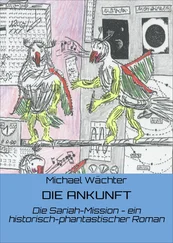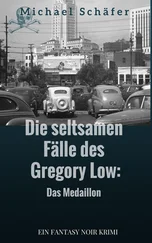A retrospective ? Weren’t those for the dead, or at least the near dead? It struck her that she was now widely regarded as a relic, an oddity. But had she been away that long? Long enough for the mildew of enigma to grow upon her? Even if she could make it there, somehow, people would ask what she’d been doing all this time, what work she’d done. “Oh, hiding in my house, watching my son paint,” she’d be forced to say. Of course she’d write the director to say she couldn’t go, but as she turned the book in her hands, she couldn’t avoid feeling some blush of pride at the crisp handsomeness of it, and at the care and delicacy the director had exhibited in his letter, which seemed intended for a person much more eccentric, fragile, and important than herself.
While reboxing the canisters to hide them in her closet, Diane noticed that Jonah and Will had left the 16mm projector set up in Cairo. Though it was nearly time for her usual 10:30 Relaxation Session, she found herself threading her first film —The Sky in Here —into the take-up reel. She made tea, snuffed the room’s lamps, drew the curtains, and coaxed the projector into a clatter.
As the film played, Diane sat quietly, her mind not so much absorbing the images as turning inward to reconstruct the person who’d shot this film, who’d synced the sound and spoke the now precious-sounding voice-over, astonished by how foreign to herself she’d become. After the first film ended she loaded another, watching them in the order she’d created them, fascination creeping into her, each film a missive from a dark region of her self she’d left unconsidered for so long.
She had such feeble command of the period after she’d watched them pull the first tatters of her brother’s body from the lake. Oh, how did she ever survive it? In the days following, she’d cried with such force she learned to navigate their house by feel, a grief so fierce and depleting her whole body felt like a turned-out pocket.
When she gathered the strength, she phoned Whalen’s house and spoke to his father for the first time. He said his son hadn’t been home since the accident, and he begged Diane to tell him where he was.
The number of the funeral home sat on her table for a week. Arranging her brother’s burial was the kind of task that grief should impel a person to do, but she couldn’t lift the receiver without fear of screaming into it, and was too proud to ask her father’s old coworkers for help.
There was still no sign of Whalen. The truth came out about how they’d been swindling the Native crew, and though Whalen’s father claimed he hadn’t laid eyes on his son since the night of the accident, the common belief was that to avoid scandal he’d changed Whalen’s name and packed him off to a university dorm somewhere back east, his head now buried in a law book. On some level she’d been preparing for Whalen to abandon her all along. As she suspected now she would have done herself had Charlie made it to university, and they lost the thrill of secrecy, left only with backgrounds and lives that could never be properly woven together.
It came then to Diane that with both Charlie and Whalen gone, and with no real ties to Thunder Bay left, for the first time in her life she was completely free to do as she pleased. She could leave, tonight, and though she wouldn’t have Charlie to answer her questions or roll up his sleeves and fight her battles, she also wouldn’t have him watching over her and correcting and interrupting and sucking the light from every moment either. It pained her to say it now, but a long-crushing weight had come off her chest, and while she hadn’t known it at the time, her brother’s accident assembled inside her a kind of engine of courage.
She packed a bag, locked the house, and walked along the creek to the highway. For months she hitchhiked south and west through a series of uncelebrated American roads. During that time she slept beneath interstate overpasses, drank from eaves troughs, ate wild raspberries and plates of all-day breakfast she’d treat herself to. She had sex with an unhappily married civil engineer who smelled like Whalen in a long aqua-colored car, then a few others as easily as talking to them. She rented weekly-rate motel rooms in a few insubstantial towns, inventing new names for herself in each one. It was during this period she’d made all of her life’s most monumental mistakes, seizing every possible occasion to endanger her mind and body, as though Charlie’s death had stripped her of the capacity to fear for her own safety. But like a plant that benefited from rough treatment and neglect, she felt more herself than she ever had in Thunder Bay.
From a pawn shop she bought a Nikon camera and a 50mm lens. She preferred photography to sketching: the immediacy, the immersion of seeing, the endless hunt for the perfect subject. She shot empty taverns, derelict train cars, abandoned bicycles, crude underpass graffiti, broken people milling around Greyhound stations, all of it — she wouldn’t realize until later — somehow touched by decay.
Eventually, after a time living with a separated beekeeper outside San Francisco who measured his food with a hanging scale and refused to orgasm for spiritual reasons, she made her way back to Canada and enrolled in some arts courses while working at a city-run day care in Toronto. She bought a smelly wool duffle coat from a thrift store and an acoustic guitar, which she plucked nightly until her fingertips hardened into thimbles. In her classes she painted murky watercolors, molded lumpy sculptures, stained glass, fired ceramics, even crocheted — her capricious interests dragging her from one artistic disappointment to the next. An instructor told her that she was cursed with the aesthetic sense to know her work was dull but lacked sufficient skill to fix it. Yet she was not discouraged. It was so much easier to fail without her father or her brother peering over her shoulder.
She came across a book on the history of cinema and after reading it in one caffeine-fueled gulp, she enrolled in film full-time. Her dedication captured the eye of her instructor, yet when called upon in class, either her voice faltered or she talked in tight, senseless circles. Near the middle of the semester, a friend from class brought her to a club popular with U of T grad students, where breathtakingly awful poetry was read as they quaffed Pernod and water. Arthur was an architecture student with tortoise-shell glasses and a clumsy girth. He had a Beach Boy wholesomeness that in a sea of Dylan and Sartre imitators infantilized those around him. Without her brother to speak for her, Diane had become a blurter — offering too much, too quickly, her sentences like a verbal yard sale — and found Arthur’s habit of thinking long and hard during conversations soothing. That night she fell into his circle and drifted to a party at an off-hours theater space, where Diane drained six cans of a tasteless beer popular in Thunder Bay that Arthur’s friends drank for its “working-class authenticity.” Soon after, she kicked Arthur in the side of the knee — hard enough to topple him to the carpet — to prove some point about pain tolerance and gender. Minutes later, she was dragging him to a secluded futon with such verve that her mind didn’t return to her body for days after.
It was a mutual friend who later told Diane that Arthur was married to a woman who’d been his English professor when he was an undergraduate. In a rushing daze Diane called this woman at the university, impersonating the dean’s clerk. Her office was slated for renovation, Diane said. When would she be next out of town at a conference so they could schedule accordingly?
Diane waited weeks until the proper time to ring his bell. Her reward was a week of cab rides to converted lofts in the East End, where they smoked hash from comically large faux-Arabic pipes. Arthur got drunk enough to stand on couches and say, “Friends, countrymen. This is essential ,” launching into speeches with full awareness of his own silliness, the discussions always devolving into the drug-addled men questioning meaning itself, which went down the conversational drain of Derrida and deconstructionism before the women cradled them off into the night.
Читать дальше












